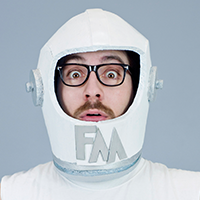We Accidentally Shot a Feature Film: How A Filmmaker's Dream Became a Passion Project Highlighting Indie Game Devs
Seven months ago, I got fed up with not being able to contribute to the game developer community as a filmmaker, so I set out to create something that was focused on that pocket of people. Then, I met the Coster brothers, and everything changed…


The Journey Begins
I’ve been creating and working in film, video, communications - whatever variant of using a camera to capture movement to tell a story - for nearly a decade. When I get asked what my biggest influence is, what drove me towards film as a medium, people are usually surprised by the answer - video games.
It all started when I booted up games like Half Life or Metal Gear Solid, and fell deep into those worlds. These were all characters and locales that I became entirely engrossed in exploring, and they all carried a strong narrative thrust. They made me laugh, they made me scared, and at times I would even get so emotionally invested that I found myself hit hard by these character’s deaths, or interpersonal struggles with supporting characters. I wanted to tell stories that were able to affect people on that rich, human level. But how could I possibly create worlds like that?
I was okay with computers, designated the family electronics guru at an early age, but I couldn't wrap my head around the math and the programming knowledge required at the time - though I dabbled in C+ and Perl a little. Instead of trying to get better at those skills, the real answer fell right into my lap - while watching old movies with my dad. I could just shoot and edit video! And that, at the ripe old age of 12, is when I decided on my life's big dream - I wanted to direct a real life, swear to god, call your folks feature film. Like the 60-90 minute, I need some popcorn over here, kind of deal.

Saint Louis - A Hidden Gaming Hub
Fast forward 14 years and it's 2015 and I’m living in St. Louis, Missouri. The film climate around me is good, I’ve got some freelance and even some full-time production work, but I keep feeling this tug that there’s this robust game development community somewhere nearby. I look into it. Turns out, there’s a demo night over at Earthbound Beer, a local bar and brewery named after the eponymous Earthbound franchise, and I decide to go check it out. Immediately after walking in, I knew this was the crowd I wanted to get in with.
There was a college student showing off a game he had developed, you had games being demoed from big, professional looking teams - there was even a game made to emulate being blind and trying to navigate a physical space. It was eye-opening.
After that night I knew that I had to get involved with this community, but I still didn’t know how. Did I want to produce some segments for a local TV show? Did I want to start a YouTube channel and interview the developers? Would they even want to talk to me? These questions caused a lot of mental stress and strain, because I knew that this group of people was special, and I didn’t want to squander all of the good will for local filmmakers by producing a flop that would leave a bad taste in everyones’ mouths. How could I put together something that covered the wide scope of developers in town, while still making it manageable for me and a small team to pull off without it getting in the way of us surviving as filmmakers?
I wrestled with my thoughts - looking everywhere for answers. I found myself on YouTube a lot. Watching things like Errant Signal, Super Bunnyhop, and Did You Know? Gaming. Then something clicked - where was the Indie Game: The Movie style serialized series? Why were all the developer interviews online produced and/or paid for by the companies employing or publishing the developer? It was time to create a web-series. I'd produce ten episodes running ten minutes a piece, with breaks between seasons. Each season could be focused on a local developer and their current project. I'd call it Dev Diary, because alliteration is cool and because it could be immediately recognizable, and I'd pitch this thing by doing some prototype / pilot versions. Now, when I say pitch, I don't mean pitch it to a network or to some company to finance - I was more worried about developers thinking I either didn't have the chops to do this, or that I was going to exploit them and their projects for quick cash. I wanted to pitch the series back to the developers themselves.

Developing for the Developers
With all of our excitement we sent out some super timid emails to folks, asking if we could cover their event, their studio, their games, or really anything that they had going on. I say "we" all of a sudden because I was able to recruit someone to my cause! James Reichmuth, who is now my long-term production partner, loved the idea and immediately wanted to hop on board to assist however he could. He and I also had some help from an old friend, Cameron Hill, and a newcomer, returning home from California, Dylan Kress. We had our team, now it was just a matter of which wild studio to start with first.
We get a hot lead on an event called PixelPop that happens every year in St. Louis (thanks for the hot lead Carol Mertz from Happy Badger Studios!) and away we went. We covered the event, met some uber-talented developers, and this snowballed into our next shoot with Happy Badger Studios, who were deep into the development of their latest game, SmuggleCraft. From there, Carol Mertz gave us another hot lead: three brothers, Adam, Seth, and Sam Coster, who owned and operated a little studio called Butterscotch Shenanigans. Things seemed to be moving pretty well for our fledgling little web-series, but this project was about to have a major shift.

Enter Butterscotch Shenanigans
All I had was an address and two phone calls that I had recently had with Sam and Seth Coster to go off of. They seemed like nice enough guys, Sam had just been through some pretty harrowing medical problems, so there were a few areas of focus for our 10-minute web episode. But what was the hook? Should I ask them about the struggles of being an indie studio in the Midwest, or focus heavier on the familial side of things, how could three brothers do ANYTHING this large together without killing each other? Should I mention Sam’s health, since that seemed to be what everyone else was interested in? There was no way of knowing as Dylan, James, and myself walked into that apartment building, but I knew that it would come together as the interview went on.
What was supposed to be a 2 hour recording session with Sam and Seth [their oldest brother, Adam, lives in Texas and works remotely] ended up becoming a 6 hour production day with all five of us crammed into Sam and Seth's workspace, which is not meant for five people, production lights, and such. We talked about everything: the development of their current game, Crashlands, how Crashlands came about out of Sam's suffering shortly after his stage 4b lymphoma diagnosis in 2013, how they had only recently added Adam to the team after Crashlands had been more fully developed, and I got to learn about all of their past games, how Sam was still struggling with an immune system transplant [you read that right... it boggled my mind too], and somehow that these three were able to run a business in the midst of all of this. That's not even mentioning the fact that Crashlands was supposed to be a 60+ hour open-world adventure game that was being developed by three guys who had no prior experience with that style of game, let alone that style of game on PC AND Mobile platforms.
There was something to this... something that just felt... different. Sam and Seth hadn't been doing too much socializing during Sam's latter stages of his medical condition, and they were just so open and friendly with us. In a weird way, it really felt as if we had known them for a very long time. Like we had all been friends. And that's a feeling that I didn't want to jeopardize or risk losing by making a wrong decision about how to approach their story and our coverage of it.
The story that the Costers gave us that day pushed us harder as filmmakers than any other story that I'd ever found, created, or developed prior. What was an original pitch for the first season of Dev Diary to the Costers shifted and grew after that, and we spent six months covering their story, the story of Crashlands, and the story of Sam defeating cancer. These brothers, who were so warm and friendly towards us, ended up letting us into their lives for a very long time... and with prying camera lenses to boot.
And... you know what? That first season of Dev Diary ended up becoming the answer to 12 year old Alessio's silent dream... it became my first feature film.
[Brace for Impact: The Crashlands Story is currently crowdfunding for post-production funding and more information can be found at the Kickstarter Page or at www.braceforimpactmovie.com. And be sure to follow along with the production on Twitter @crashlandsfilm or @frvranastronaut. Dev Diary is still in development and can be found at www.devdiaryseries.com]
Read more about:
BlogsAbout the Author(s)
You May Also Like









